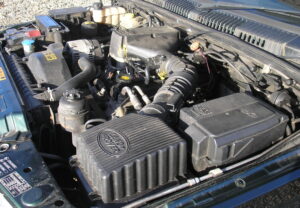Land Rover P38 most common problems
2. Cold engine
4. Leaks
Diesel common problems
The most common problems with the Land Rover P38.
- Glow Plug Failure: Diesel engines in the Land Rover P38 can experience difficulties starting in cold weather due to faulty glow plugs. If the glow plugs fail, the engine may struggle to ignite properly, especially during cold starts.
- Fuel System Issues: Cold temperatures can affect the diesel fuel’s viscosity, potentially leading to clogged fuel filters or problems with the fuel pump. Proper maintenance of the fuel system is essential to prevent starting and performance issues.
Cold engine
- Battery Health: Cold weather can strain the battery. Make sure the battery is fully charged and capable of providing sufficient power for starting the engine in low temperatures.
- Fuel Quality: Diesel fuel quality can also affect cold starting. Use high-quality diesel fuel with appropriate additives for cold weather conditions.
Air suspension problems
- Air Spring Leaks: The air suspension system in the Land Rover P38 is prone to leaks in the air springs. Common symptoms include the vehicle sagging or riding unevenly. Regularly inspect and replace worn air springs to maintain proper suspension function.
- Compressor Issues: The air compressor responsible for inflating the air springs can fail or become noisy over time. Check for abnormal compressor sounds or issues with air pressure delivery to diagnose compressor problems.
- Height Sensor Malfunction: Faulty height sensors can cause inaccuracies in the suspension’s leveling, affecting ride quality and vehicle stability. Ensure height sensors are calibrated and functioning correctly.
Leaks
- Engine Oil Leaks: Land Rover P38s, particularly diesel models, may experience engine oil leaks from areas such as the valve cover gaskets, oil pan gasket, or other seals. Regularly inspect the engine for oil leaks and address any issues promptly to prevent further damage.
- Coolant Leaks: Check for coolant leaks, which can arise from radiator hoses, water pump, or the coolant reservoir. Coolant leaks can lead to engine overheating and should be fixed to maintain proper engine cooling.
- Transmission Fluid Leaks: Transmission fluid leaks can occur from damaged seals or gaskets in the transmission system. Monitor transmission fluid levels and address leaks promptly to prevent transmission damage.
Are you already a proud owner of a Land Rover P38? If so, check out our selection of parts for this car at the following link:
https://octoclassic.com/product-category/range-rover/p38
Photos sources: superproeurope.com, drive-my.com, parkwayspecialistcars.co.uk, bodylogicuk.com











